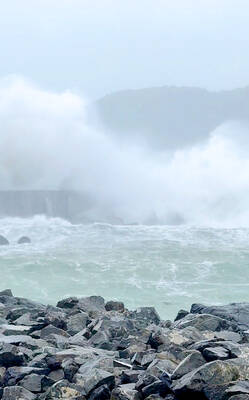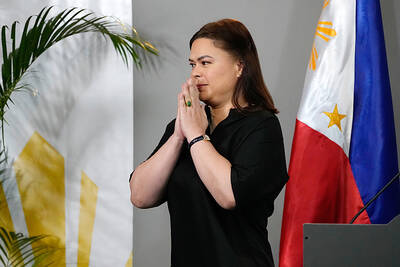Hoping to avoid a UN showdown, Iran and the EU's three big powers reached a preliminary agreement over Tehran's nuclear program, Iran's chief negotiator said.
Meanwhile, lawmakers in Iran's conservative-dominated parliament pushed for a bill banning the production of nuclear weapons in a gesture aimed at building more international trust.
The preliminary agreement worked out in Paris with Britain, France and Germany could be finalized in the next few days, chief Iranian negotiator Hossein Mousavian told state-run Iranian television on Sunday from Paris, where talks wrapped up on Saturday.
If approved, the deal would be a major breakthrough after months of threats and negotiations and could spare Iran from being taken before the UN Security Council, where the US has warned it would seek to impose economic sanctions unless Tehran gives up all uranium enrichment activities, a technology that can produce nuclear fuel or atomic weapons.
The head of the International Atomic Energy Agency, Mohamed ElBaradei, called the agreement "a step in the right direction."
Diplomats in Austria familiar with the outcome of the talks declined to discuss details.
"One or two points remain outstanding, and they hope to resolve those outstanding points by Wednesday," one diplomat said.
In proposals to Iran last month, Britain, Germany and France offered a trade deal and peaceful nuclear technology -- including a light-water research reactor -- if Iran pledged to indefinitely suspend uranium enrichment and related activities such as reprocessing uranium and building centrifuges used to enrich it.
"We had 22 hours of negotiations ... They were very difficult and complicated negotiations but we reached a preliminary agreement at the expert level," Mousavian said.
He said the four countries must now ask their governments to approve the accord.
The preliminary agreement appeared to mark a dramatic breakthrough, since Iranian officials have resisted indefinite or long-term sus-pension of nuclear enrichment, a process that Iran is permitted to pursue under the nuclear nonprolif-eration treaty, which Tehran has signed. While not being in breach of the treaty, Iran is under heavy international pressure to drop such plans as a good faith gesture.

Heavy rain and strong winds yesterday disrupted flights, trains and ferries, forcing the closure of roads across large parts of New Zealand’s North Island, while snapping power links to tens of thousands. Domestic media reported a few flights had resumed operating by afternoon from the airport in Wellington, the capital, although cancelations were still widespread after airport authorities said most morning flights were disrupted. Air New Zealand said it hoped to resume services when conditions ease later yesterday, after it paused operations at Wellington, Napier and Palmerston North airports. Online images showed flooded semi-rural neighborhoods, inundated homes, trees fallen on vehicles and collapsed

‘COST OF DEFECTION’: Duterte’s announcement could be an effort to keep allies in line with the promise of a return to power amid political uncertainty, an analyst said Philippine Vice President Sara Duterte yesterday announced she would run for president of the Southeast Asian nation of 116 million in 2028. Duterte, who is embroiled in a bitter feud with Philippine President Ferdinand Marcos Jr, was impeached last year only to see the country’s Supreme Court throw the case out over procedural issues. Her announcement comes just days before her father, former Philippine president Rodrigo Duterte, begins a pretrial hearing at the International Criminal Court (ICC) in the Netherlands over crimes against humanity allegedly committed as part of a brutal crackdown on drugs. “I offer my life, my strength and my future

FEROCIOUS FISH-EATER Scientists have found a new species of dinosaur from the Cretaceous Period, a ‘hell heron’ that stalked the rivers, deep in the Saharan desert At a remote Sahara desert site in Niger, scientists have unearthed fossils of a new species of Spinosaurus, among the biggest of the meat-eating dinosaurs, notable for its large blade-shaped head crest and jaws bearing interlocking teeth for snaring fish. It prowled a forested inland environment and strode into rivers to catch sizable fish like a modern-day wading bird — a “hell heron,” as one of the researchers put it, considering it was about 12 meters long and weighed 5-7 tons. The dinosaur presented a striking profile on the Cretaceous Period landscape of Africa some 95 million years ago as it hunted

NOT YET THERE: While the show was impressive, it failed to demonstrate their ability to move in unstructured environments, such as a factory floor, an expert said Dancing humanoid robots on Monday took center stage during the annual China Media Group’s Spring Festival Gala, China’s most-watched official television broadcast. They lunged and backflipped (landing on their knees), they spun around and jumped. Not one fell over. The display was impressive, but if robots can now dance and perform martial arts, what else can they do? Experts have mixed opinions, with some saying the robots had limitations and that the display should be viewed through a lens of state propaganda. Developed by several Chinese robotics firms, the robots performed a range of intricate stunts, including martial arts, comedy sketches and choreographed